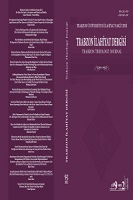Hadislerin Kabul ve Reddinde İcmâın Rolü
The Role of the Ijmāʿ in Acceptance and Rejection of Hadīths
Author(s): Esma Yılmazlar, Yavuz KöktaşSubject(s): Islam studies, Contemporary Islamic Thought, Qur’anic studies
Published by: Karadeniz Teknik Üniversites - İlahiyat Fakültesi
Keywords: Hadīth; Critisizm of hadīth; al-Khabar al-wāhid; Contradiction with ijmāʿ; Muhaddith;
Summary/Abstract: Ijmāʿ, which is based on the principle that “the ummah will not unite on a mistake” in the theoretical sense; also forms the basis of issues such as the transmitting Qur’an to the later generations and determination of what is in the sunnah and what is not. Therefore, it has an epistemic value in almost all Islamic sciences. This study deals with the function of ijmāʿ in the science of fiqh and hadīth in the acceptance and rejection of narrations. Discussions that narrations should be compatible with ijmāʿ have been on the agenda of schools of theology and jurisprudence since the second century of the hijra. Since the jurists (fuqaha) thought that the proof and signification of the al-khabar al-wāhids were speculative, they benefited from the certainty of ijmāʿ in their theory of khabar. Muhaddith, on the other hand, gave a role to ijmāʿ in the criticism, interpretation, and explanation of the hadīths that they judged according to the criteria of isnad and rijal criticism in the classical hadith method. With this research, it is aimed to contribute to the understanding of the method used in the evaluation of the narrations since the second hijrī century and the nature of the consensus used. Thus, it will be concluded that ijmāʿ is not one of the methods of textual criticism of the hadīths as claimed.
Journal: Trabzon İlahiyat Dergisi
- Issue Year: 9/2022
- Issue No: 2
- Page Range: 2-29
- Page Count: 28
- Language: Turkish

